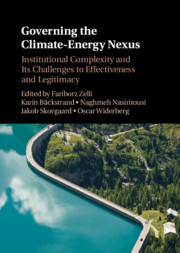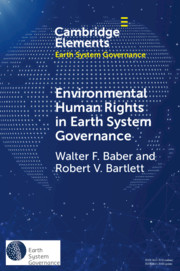Refine listing
Actions for selected content:
2285 results in Ebooks in ecology and environment

Governing the Climate-Energy Nexus
- Institutional Complexity and Its Challenges to Effectiveness and Legitimacy
-
- Published online:
- 26 June 2020
- Print publication:
- 16 July 2020
-
- Book
-
- You have access
- Open access
- Export citation

Environmental Human Rights in Earth System Governance
- Democracy beyond Democracy
-
- Published online:
- 29 May 2020
- Print publication:
- 25 June 2020
-
- Element
- Export citation
Appendix D - Statistical Inference
-
- Book:
- Statistical Analysis of Climate Extremes
- Published online:
- 23 April 2020
- Print publication:
- 14 May 2020, pp 152-164
-
- Chapter
- Export citation
References
-
- Book:
- Statistical Analysis of Climate Extremes
- Published online:
- 23 April 2020
- Print publication:
- 14 May 2020, pp 179-194
-
- Chapter
- Export citation
Appendix G - List of Symbols and Abbreviations
-
- Book:
- Statistical Analysis of Climate Extremes
- Published online:
- 23 April 2020
- Print publication:
- 14 May 2020, pp 174-178
-
- Chapter
- Export citation
Frontmatter
-
- Book:
- Statistical Analysis of Climate Extremes
- Published online:
- 23 April 2020
- Print publication:
- 14 May 2020, pp i-iv
-
- Chapter
- Export citation
Appendix E - Numerical Techniques
-
- Book:
- Statistical Analysis of Climate Extremes
- Published online:
- 23 April 2020
- Print publication:
- 14 May 2020, pp 165-171
-
- Chapter
- Export citation
Appendix A - Climate Measurements
-
- Book:
- Statistical Analysis of Climate Extremes
- Published online:
- 23 April 2020
- Print publication:
- 14 May 2020, pp 135-138
-
- Chapter
- Export citation
Dedication
-
- Book:
- Statistical Analysis of Climate Extremes
- Published online:
- 23 April 2020
- Print publication:
- 14 May 2020, pp v-vi
-
- Chapter
- Export citation
3 - Methods
-
- Book:
- Statistical Analysis of Climate Extremes
- Published online:
- 23 April 2020
- Print publication:
- 14 May 2020, pp 27-49
-
- Chapter
- Export citation
4 - Floods and Droughts
-
- Book:
- Statistical Analysis of Climate Extremes
- Published online:
- 23 April 2020
- Print publication:
- 14 May 2020, pp 50-67
-
- Chapter
- Export citation
6 - Hurricanes and Other Storms
-
- Book:
- Statistical Analysis of Climate Extremes
- Published online:
- 23 April 2020
- Print publication:
- 14 May 2020, pp 103-134
-
- Chapter
- Export citation
Index
-
- Book:
- Statistical Analysis of Climate Extremes
- Published online:
- 23 April 2020
- Print publication:
- 14 May 2020, pp 195-200
-
- Chapter
- Export citation
2 - Data
-
- Book:
- Statistical Analysis of Climate Extremes
- Published online:
- 23 April 2020
- Print publication:
- 14 May 2020, pp 10-26
-
- Chapter
- Export citation
Appendix F - Data and Software
-
- Book:
- Statistical Analysis of Climate Extremes
- Published online:
- 23 April 2020
- Print publication:
- 14 May 2020, pp 172-173
-
- Chapter
- Export citation
Contents
-
- Book:
- Statistical Analysis of Climate Extremes
- Published online:
- 23 April 2020
- Print publication:
- 14 May 2020, pp vii-x
-
- Chapter
- Export citation
1 - Introduction
-
- Book:
- Statistical Analysis of Climate Extremes
- Published online:
- 23 April 2020
- Print publication:
- 14 May 2020, pp 1-9
-
- Chapter
- Export citation
Preface
-
- Book:
- Statistical Analysis of Climate Extremes
- Published online:
- 23 April 2020
- Print publication:
- 14 May 2020, pp xi-xii
-
- Chapter
- Export citation
Appendix B - Natural Climate Archives
-
- Book:
- Statistical Analysis of Climate Extremes
- Published online:
- 23 April 2020
- Print publication:
- 14 May 2020, pp 139-148
-
- Chapter
- Export citation
Appendix C - Physical Climate Models
-
- Book:
- Statistical Analysis of Climate Extremes
- Published online:
- 23 April 2020
- Print publication:
- 14 May 2020, pp 149-151
-
- Chapter
- Export citation
